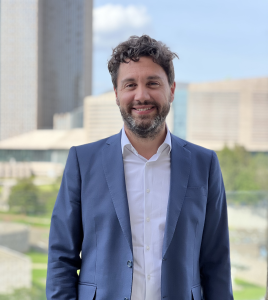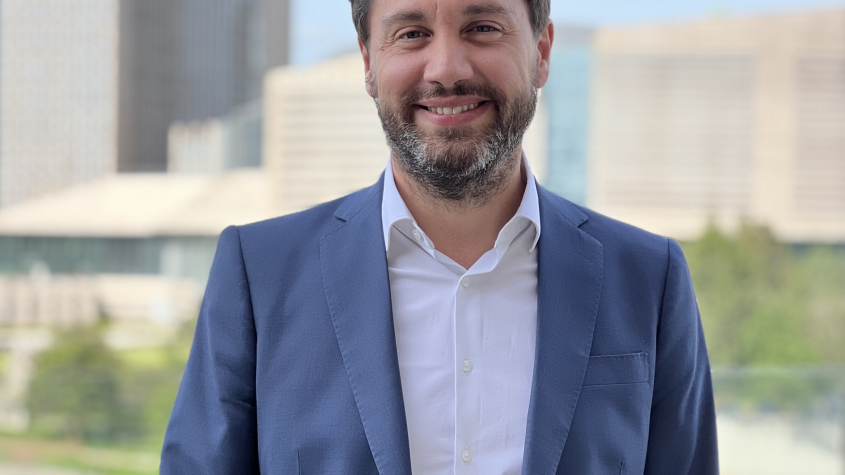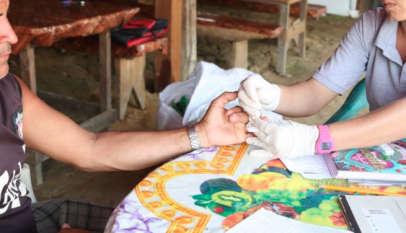INTERVIEW | “Germany Will Continuously Remain Africa’s Strong Partner” – Director, GIZ African Union
Dr Tobias Thiel, Director of the Deutsche Gesellschaft für Internationale Zusammenarbeit (GIZ) Office to the African Union, speaks on the German Federal Ministry for Economic Cooperation and Development’s (BMZ) New Africa Strategy: Shaping the Future with Africa, focused on trade, migration, peace and security as well as public health, among others.

Newspage: The BMZ’s New Africa Strategy describes the AfCFTA as “an incredible opportunity to dismantle barriers to trade inside Africa.” With Germany being one of the biggest supporters of the AfCFTA, what is your vision for boosting intra-African trade?
Dr Thiel: Our vision as an implementing organization for BMZ is centered around leveraging the transformative potential of the African Continental Free Trade Area (AfCFTA) for intra-African trade and advancing the AU’s industrialization agenda. In terms of trade, African economies are much more integrated with the rest of the world than with each other.
Africa has a market of 1.3 billion people and a combined GDP of USD 3.4 trillion. This landmark agreement has the capacity to more than double intra-African trade, fuel the growth of the industrial sector, and create countless new jobs. As a result, the AfCFTA holds the promise of significantly alleviating extreme poverty and addressing critical challenges such as food insecurity and import dependencies.
A striking example of this need emerged during Africa’s food crisis in 2022. This was exacerbated by global fertilizer shortages. Sub-Saharan countries faced a 50–80% gap in annual supply, largely due to Africa’s heavy reliance on fertilizer imports. Although there are African fertilizer production hubs like Nigeria, their exports have traditionally been directed outside the continent. The AfCFTA thus presents a monumental opportunity to expand intra-regional trade in fertilizers by establishing unified standards, enhancing infrastructure, as well as reducing production and trade costs.
Recognizing that unlocking the full potential of the AfCFTA requires enhancing productive capacities within Africa, GIZ – on behalf of the German Government – is actively collaborating with the AU to advance industrialization, which reduces the exportation of unprocessed raw materials.
Our support for the African Women in Processing Initiative (AWIP), for instance, ensures that women in processing industries are empowered and enjoy equitable access to industrial opportunities. Thus, this is contributing significantly to Africa’s broader economic transformation and industrialization agendas.
Moreover, our involvement extends to the organization of the Intra African Trade Fair (IATF2023), which serves as the AfCFTA’s marketplace by offering a substantial platform for African entrepreneurs, investors, and public officials to jointly drive forward economic growth. I am therefore convinced that the AfCFTA creates a win-win situation for all stakeholders involved.
Newspage: Germany’s cooperation with the AU includes support for the ratification and implementation of the AU-Free Movement Protocol (FMP) to make intra-African migration “beneficial and fair for countries of origin, destination countries and the migrants themselves.” How strong is the interdependency between FMP and AfCFTA?
Dr Thiel: The interdependency between free movement of persons and the AfCFTA is undeniably strong. This synergy is not only highlighted in the AU’s Agenda 2063 but also stems from the fact that economic development, trade, and labor migration are inherently intertwined. Without people, the seamless flow of goods and services across borders would be impossible. Both the free movement of people and trade have the potential to propel the continent towards substantial economic growth.
In fact, the AU Migration Policy Framework for Africa (MPFA) recognizes the importance of the trade-labor-migration nexus and its interdependence with the free movement of people. As a cornerstone of trade and economic integration, free movement facilitates the flow of goods and services, promotes industrialization, and, subsequently, contributes to socio-economic development and poverty reduction.
On behalf of Germany, GIZ does not only supports the AU in implementing the AfCFTA but also in labor migration and the free movement of persons. These are essential prerequisites for the successful realization of the African Continental Free Trade Area.
Free movement of persons is a politically sensitive issue touching on aspects such as trade and labor migration, border governance, as well as peace and security. Research shows that the economic benefits it offers in terms of regional integration and sustainable development outweigh its associated challenges and drawbacks. Thus, GIZ does not only collaborate with the AU Commission but also engages with civil society, academia, and the media to shape positive narratives about the economic advantages associated with free movement!
Newspage: Germany supports the AU’s efforts to promote peace, security, and democratic governance. What do you make of the recent resurgence of unconstitutional changes in government in Africa?
Dr Thiel: The current governance and security challenges on the African continent, particularly the rise in Unconstitutional Changes of Government (UCG), such as military coups, are a deep concern to many Africans. The Accra Declaration on Unconstitutional Changes of Government in Africa was adopted by the AU on March 17, 2022 and pertinently highlights that addressing UCGs requires a holistic, multi-level approach that takes into account the unique context of each affected country.
The AU’s African Governance Architecture – in short AGA – and African Peace and Security Architecture – in short APSA, along with Regional Economic Communities and Regional Mechanisms, provide various instruments and initiatives designed to prevent and tackle UCGs. The AU and other stakeholders are committed to implementing the various mechanisms, initiatives and instruments in a coordinated manner, thereby ensuring the active involvement of citizens.
When supporting the AU Commission’s Department for Political Affairs, Peace, and Security (AUC PAPS) on behalf of the German Government, GIZ does not take any political positions but supports the goals the AU has set for itself in its endeavor to prevent and combat UCGs. Recognizing that prevention is crucial in averting future UCGs, we prioritize prevention efforts.
In this regard, our collaboration with AUC PAPS focuses, among other areas, on enhancing synergies between AGA and APSA through support for the African Peer Review Mechanism. This approach enables the early detection and mitigation of governance deficiencies, socio-economic inequalities, developmental challenges, and other critical factors, thereby mitigating the risk of political instability and UCGs.
Newspage: The COVID-19 pandemic exposed Africa’s weak health systems. Subsequently, Germany is one of the biggest supporters of the Africa CDC; how strong is Africa’s pandemic preparedness now?
Dr Thiel: A year after the World Health Organization (WHO) officially announced the end of the global COVID-19 pandemic, African health institutions learned many lessons on pandemic preparedness. At the same time, the level of preparedness varies considerably from one country to another. Africa experiences more than 100 outbreaks of infectious diseases on an annual basis, which not only pose a threat to the health of its people but also impede its progress towards achieving UN Sustainable Development Goal 3 (Good Health and Well-Being).
As part of our unwavering commitment to supporting the African continent, Germany, through GIZ, is working closely with the AU Commission and the Africa CDC to fully implement the Africa Health Strategy and the New Public Health Order for Africa. This strategy seeks to establish a foundation for the long-term prevention of future outbreaks and issues of health security on the continent. Our primary focus is directed towards further strengthening African public health institutions by enhancing the core capacities of the Africa CDC in areas such as organizational development as well as project and partnership management.
We are also involved in supporting the establishment of the African Medicines Agency and the African Pharmaceutical Technology Foundation to further develop local pharmaceutical manufacturing. This goes hand in hand with the German Development Cooperation’s bilateral initiatives on local vaccine manufacturing in Ghana, Rwanda, Senegal and South Africa.
One of our notable contributions includes supporting the AU Bingwa COVID-19 Vaccination Initiative, a network of youth champions across the continent to accelerate the uptake of COVID-19 vaccination in Africa. Currently, we are exploring opportunities to leverage these networks of young people to address other pressing health concerns. Some of these endeavors have started to respond to the COVID-19 pandemic, and they will also have a positive impact on addressing ongoing and emerging health threats. These initiatives play a key role in fortifying Africa’s long-term pandemic preparedness and prevention efforts.
Given Germany’s strong commitment to health and pandemic prevention, which we can see in the BMZ’s new Africa Strategy, we will remain a strong partner in supporting Africa’s pursuit of its own health objectives for the years to come.














